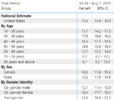Covid is now like influenza, RSV, rhinoviruses, and a large number of other pathogens that will at some point or points in a year increase in transmission activity and then decline, ceding the stage to something else that can make people cough, sneeze, run a fever, feel lousy, and sometimes require medical care and can on occasion lead to death. To be sure, Covid currently is the worst member of that gang, still killing more people a year than influenza, which previously wore the worst actor badge.
But when we’re looking at Covid, it’s important to remember that we are in a markedly different phase in our experience with SARS-2 than we were even a year ago, experts insist. Yes, the number of new hospital admissions is rising, and the number of deaths may follow. But they are far below the figures of previous years. In the last week of August 2021, there were nearly 86,000 new hospital admissions. Last year at the same time, the number was 37,000. This year it was 17,400.



